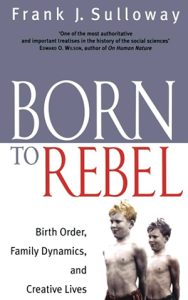Born to Rebel: Birth Order, Family Dynamics, and Creative Lives

Author: Frank J. Sulloway
Publisher: Vintage
Year of Publication: 1997
Print Length: 672 pages
Genre: Non-Fiction / Social Science, Psychology
Topic: Family, Birth Order, History, Human Nature & Character, Human Psyche, Politics & Power
Why do people raised in the same families often differ more dramatically in personality than those from different families? What made Charles Darwin, Benjamin Franklin, and Voltaire uniquely suited to challenge the conventional wisdom of their times? This pioneering inquiry into the significance of birth order answers both these questions with a conceptual boldness that has made critics compare it with the work of Freud and of Darwin himself.
Frank J. Sulloway envisions families as ecosystems in which siblings compete for parental favor by occupying specialized niches. Combing through thousands of biographies in politics, science, and religion, he demonstrates that firstborn children are more likely to identify with authority whereas their younger siblings are predisposed to rise against it. Family dynamics, Sulloway concludes, is a primary engine of historical change.
Elegantly written, masterfully researched, Born to Rebel is a grand achievement that has galvanized historians and social scientists and will fascinate anyone who has ever pondered the enigma of human character.
Table of Contents
Introduction
PART ONE: BIRTH ORDER AND REVOLUTIONARY PERSONALITY
1. Openness to Scientific Innovation
2. Birth Order and Scientific Revolutions
3. Birth Order and Personality
PART TWO: ALL IN THE FAMILY
4. Family Niches
5. Developmental Glitches
6. Gender
7. Temperament
8. Exceptions to the Rule
PART THREE: SOCIAL AND POLITICAL THOUGHT
9. Social Attitudes
10. The Darwinian Revolution as Social History
11. The Protestant Reformation
12. Political Trends
13. The French Revolution
PART FOUR: SYNTHESIS
14. Social and Intellectual Context
15. Conclusion
Appendices:
1. A Brief Introduction to Statistics (or Correlations Made Easy) / 2. Coding Procedures for Variables in the Study / 3. Criteria for Selection of Participants in Scientific Controversies / 4. Expert Raters and Other Collaborators / 5. Techniques for Estimating Missing Data / 6. Data and Expert Ratings on Social Attitudes / 7. Modeling the Protestant Reformation / 8. Modeling the French Revolution / 9. Miscellaneous Technical Discussions / 10. Suggestions for Future Research / 11. How to Test Your Own Propensity to Rebel
List of Illustrations
List of Figures
List of Tables
Acknowledgements
Notes
Bibliography
Index

Frank J. Sulloway is an Adjunct Professor in the Department of Psychology, and is also a member of the Institute of Personality and Social Research, at the University of California, Berkeley. He has a Ph.D. in the history of science from Harvard University (1978) and is a recipient of a MacArthur Award (1984-1989). His book Freud, Biologist of the Mind: Beyond the Psychoanalytic Legend (1979) provides a radical reanalysis of the origins and validity of psychoanalysis and received the Pfizer Award of the History of Science Society. For the last two decades, Dr. Sulloway has employed evolutionary theory to understand how family dynamics affect personality development, including that of creative geniuses. He has a particular interest in the influence that birth order exerts on personality and behavior.
Source: http://www.sulloway.org/
More from Frank J. Sulloway in this library, click here.
